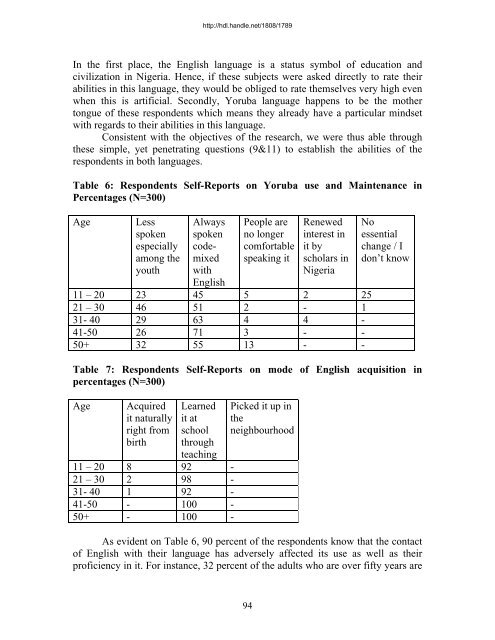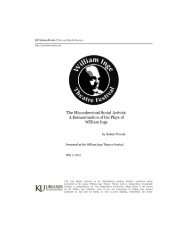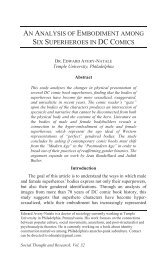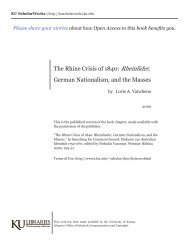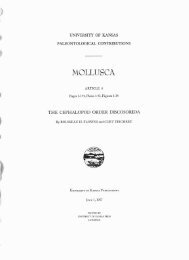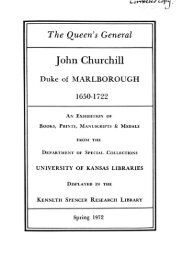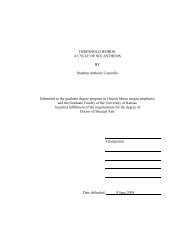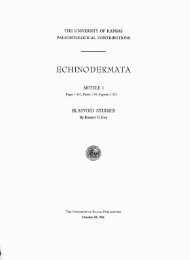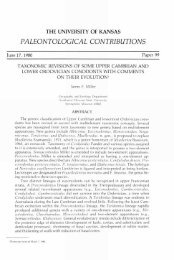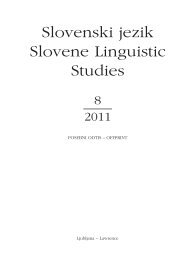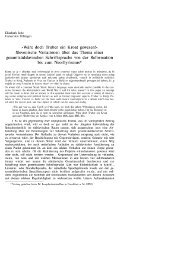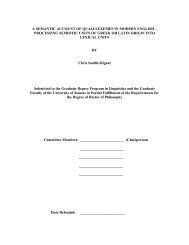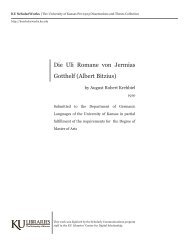LANGUAGE CONTACT AND LANGUAGE ... - KU ScholarWorks
LANGUAGE CONTACT AND LANGUAGE ... - KU ScholarWorks
LANGUAGE CONTACT AND LANGUAGE ... - KU ScholarWorks
You also want an ePaper? Increase the reach of your titles
YUMPU automatically turns print PDFs into web optimized ePapers that Google loves.
http://hdl.handle.net/1808/1789<br />
In the first place, the English language is a status symbol of education and<br />
civilization in Nigeria. Hence, if these subjects were asked directly to rate their<br />
abilities in this language, they would be obliged to rate themselves very high even<br />
when this is artificial. Secondly, Yoruba language happens to be the mother<br />
tongue of these respondents which means they already have a particular mindset<br />
with regards to their abilities in this language.<br />
Consistent with the objectives of the research, we were thus able through<br />
these simple, yet penetrating questions (9&11) to establish the abilities of the<br />
respondents in both languages.<br />
Table 6: Respondents Self-Reports on Yoruba use and Maintenance in<br />
Percentages (N=300)<br />
Age<br />
Less<br />
spoken<br />
especially<br />
among the<br />
youth<br />
Always<br />
spoken<br />
codemixed<br />
with<br />
English<br />
People are<br />
no longer<br />
comfortable<br />
speaking it<br />
Renewed<br />
interest in<br />
it by<br />
scholars in<br />
Nigeria<br />
11 – 20 23 45 5 2 25<br />
21 – 30 46 51 2 - 1<br />
31- 40 29 63 4 4 -<br />
41-50 26 71 3 - -<br />
50+ 32 55 13 - -<br />
No<br />
essential<br />
change / I<br />
don’t know<br />
Table 7: Respondents Self-Reports on mode of English acquisition in<br />
percentages (N=300)<br />
Age<br />
Acquired<br />
it naturally<br />
right from<br />
birth<br />
Learned<br />
it at<br />
school<br />
through<br />
teaching<br />
11 – 20 8 92 -<br />
21 – 30 2 98 -<br />
31- 40 1 92 -<br />
41-50 - 100 -<br />
50+ - 100 -<br />
Picked it up in<br />
the<br />
neighbourhood<br />
As evident on Table 6, 90 percent of the respondents know that the contact<br />
of English with their language has adversely affected its use as well as their<br />
proficiency in it. For instance, 32 percent of the adults who are over fifty years are<br />
94


